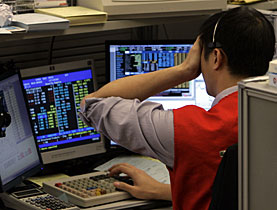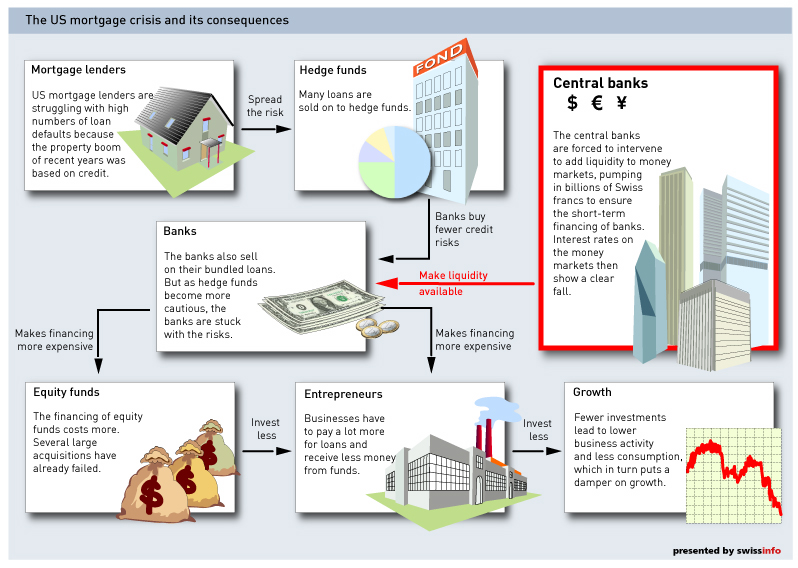Bear Stearns collapse rocks stock markets

Bank shares have led the sharp drop on stock markets with Switzerland's largest financial institution, UBS, badly hit and plunging nearly 14 per cent on Monday.
The latest event to affect share prices was the sale on Sunday of the United States investment bank, Bear Stearns, to JP Morgan Chase for $236.2 million – a small fraction of its earlier value.
The move, along with the US Federal Reserve’s decision to extend lending to a wider range of financial firms – for the first time in 80 years – was meant to stem a sell-off on Wall Street. It had the opposite effect.
Switzerland’s other big bank, Credit Suisse, also took a large hit – dropping 8.62 per cent – and together with UBS pulled the SMI blue chip index down five per cent to 6,774 points – its lowest level since the autumn of 2005.
But despite the large drop in the two banks’ share prices, the Swiss Banking Commission said both institutions were still on strong financial ground.
“Nothing has changed regarding the liquidity of either of the big banks,” said Commission spokesman Tobias Lux.
“Too big to fail”
Analysts at Keefe, Bruyette & Woods told the Associated Press news agency that both Swiss banks were regarded as “too big to fail”.
One of the banks hardest hit by the US subprime mortgage crisis, UBS has had to write down $18 billion.
In an effort to deal with the crisis, shareholders approved a capital injection of more than $12 billion at the end of last month.
On Sunday, a newspaper report said the bank was planning to cut up to 8,000 jobs, or between five and ten per cent of its worldwide workforce. The bank refused to either confirm or deny the report.
Despite the market turbulence, the Swiss Economic Institute KOF said Switzerland’s economy was still buoyant.
Vigorous growth
In its 2008 forecast released on Monday, KOF said goods and financial services exports would be most affected by the mortgage crisis, but domestic demand would “grow vigorously and thereby provide substantial support to Switzerland’s economic growth”.
It said the main reason for this was the country’s robust job market, with employment increasing by 2.7 per cent last year, which will lead to “a conspicuous increase in private consumption in 2008”.
KOF forecast growth rates for the Swiss economy of 2.1 per cent this year and two per cent in 2009.
swissinfo with agencies
The dollar continued its slide on Monday.
It dropped to all time lows against the euro, yen and Swiss franc.
After the franc reached parity with the dollar last week, the dollar dropped on Monday against the franc to SFr0.9637.
(2008, 2009, publication)
Seco 1.9, 1.7, 20.12.2007
SNB 1.5-2.0, – , 13.03.2008
UBS 1.5, 1.6, 28.01.2008
Credit Suisse 1.9, 1.6, 12.03.2008
KOF 2.1, 1.9, 17.12.2007
BAK Basel Economics 2.1, 2.0, 12.03.2008
OECD 2.0, 2.0, 06.12.2007


In compliance with the JTI standards
More: SWI swissinfo.ch certified by the Journalism Trust Initiative



You can find an overview of ongoing debates with our journalists here. Please join us!
If you want to start a conversation about a topic raised in this article or want to report factual errors, email us at english@swissinfo.ch.